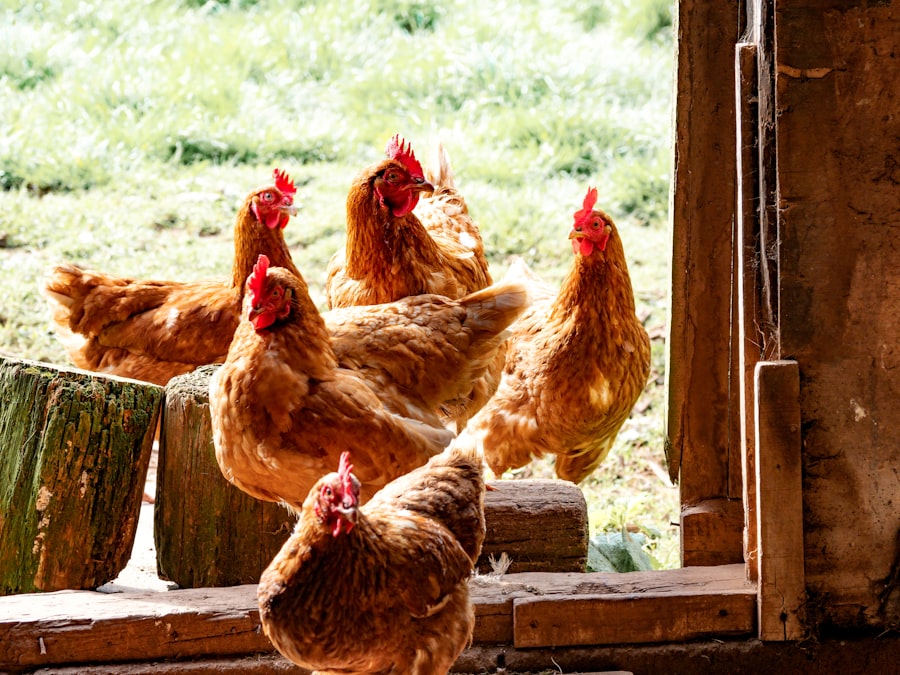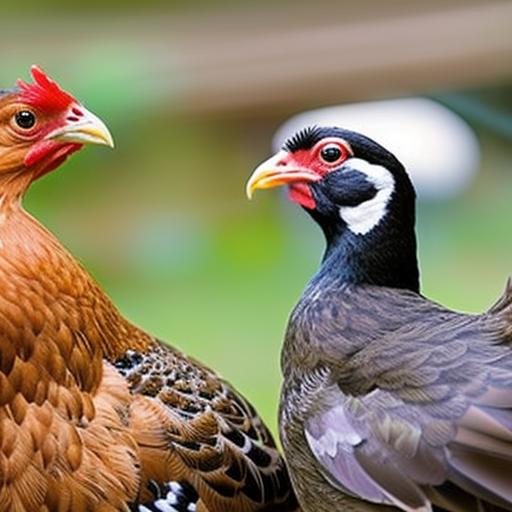Keeping chickens at home has become a growing trend in recent years, as more and more people are discovering the joys and benefits of having their own flock. Not only do chickens provide a sustainable source of fresh eggs, but they also offer natural pest control and can be a fun and educational addition to any backyard. Whether you live in a rural area or an urban setting, keeping chickens at home is a rewarding and fulfilling experience.
One of the main benefits of keeping chickens at home is the access to fresh eggs. There is nothing quite like collecting eggs from your own backyard and knowing exactly where they came from. Not only are fresh eggs delicious, but they are also more nutritious than store-bought eggs. Chickens that are allowed to roam freely and eat a varied diet produce eggs that are higher in omega-3 fatty acids, vitamin E, and beta-carotene.
Another benefit of keeping chickens is their natural pest control abilities. Chickens love to forage for insects, slugs, and other pests in the yard, helping to keep your garden free from unwanted critters. They also eat kitchen scraps, reducing waste and providing a sustainable way to dispose of food scraps.
Key Takeaways
- Keeping chickens at home is a rewarding and sustainable hobby that provides fresh eggs and fertilizer.
- Choosing the right chicken coop is important for the health and safety of your chickens.
- Building a chicken coop from scratch can be a fun and cost-effective option.
- Essential features of a chicken coop include nesting boxes, roosting bars, and adequate space.
- Proper ventilation and lighting are crucial for the health and well-being of your chickens.
Choosing the Right Chicken Coop
Choosing the right chicken coop is essential for the health and well-being of your flock. There are several factors to consider when selecting a coop, including size, materials, and location.
Firstly, you need to determine how many chickens you plan to keep and choose a coop that is large enough to accommodate them comfortably. The general rule of thumb is to allow 4 square feet of space per chicken inside the coop and 10 square feet per chicken in the outdoor run. This will ensure that your chickens have enough room to move around and engage in natural behaviors.
When it comes to materials, there are several options available. Wood is a popular choice for its durability and natural insulation properties. However, it requires regular maintenance to prevent rot and decay. Alternatively, you can opt for plastic or metal coops, which are easier to clean and maintain but may not provide the same level of insulation.
The location of your chicken coop is also important. It should be placed in a well-drained area that is protected from strong winds and direct sunlight. It should also be easily accessible for cleaning and egg collection.
Building a Chicken Coop from Scratch
If you are feeling handy, building a chicken coop from scratch can be a rewarding project. Here is a step-by-step guide to help you get started:
1. Plan the design: Before you start building, it’s important to have a clear plan in mind. Consider the size of your flock, the available space, and any specific features you want to include in your coop.
2. Gather materials and tools: Once you have a design in mind, gather all the necessary materials and tools. This may include lumber, screws, wire mesh, roofing materials, and basic hand tools.
3. Build the frame: Start by building the frame of the coop using the lumber. Cut the pieces to size and assemble them using screws or nails. Make sure the frame is sturdy and level.
4. Add walls and roof: Once the frame is complete, add walls and a roof to provide shelter for your chickens. Use plywood or other suitable materials for the walls and roofing materials such as shingles or metal sheets for the roof.
5. Install doors and windows: Cut openings for doors and windows in the walls of the coop. Install hinges and latches to make them functional.
6. Add nesting boxes and roosting bars: Nesting boxes are essential for your hens to lay their eggs. Install them inside the coop, making sure they are easily accessible for egg collection. Roosting bars should also be installed at a height that allows your chickens to perch comfortably.
7. Install wire mesh: To keep your chickens safe from predators, cover the windows and any other openings with wire mesh. This will allow for ventilation while keeping out unwanted visitors.
8. Add bedding and accessories: Finally, add bedding material such as straw or wood shavings to the floor of the coop. You can also include accessories such as feeders and waterers to make your chickens’ lives more comfortable.
Essential Features of a Chicken Coop
A well-designed chicken coop should include several essential features to ensure the health and well-being of your flock. These features include nesting boxes, roosting bars, and adequate ventilation.
Nesting boxes are essential for your hens to lay their eggs in a safe and comfortable environment. They should be located in a quiet and secluded area of the coop, away from the roosting bars. Each nesting box should be large enough for a hen to comfortably enter and exit, with dimensions of around 12×12 inches.
Roosting bars provide a place for your chickens to perch at night. They should be installed at a height that allows your chickens to comfortably roost without touching the walls or ceiling of the coop. The recommended height is around 18 inches from the floor.
Proper ventilation is crucial for maintaining good air quality inside the coop and preventing the buildup of moisture and ammonia. Ventilation can be achieved through windows, vents, or openings covered with wire mesh. It’s important to strike a balance between providing enough ventilation to keep the air fresh and preventing drafts that can cause cold stress in your chickens.
Proper Ventilation and Lighting for Your Chicken Coop
Proper ventilation is essential for maintaining good air quality inside your chicken coop. Poor ventilation can lead to a buildup of moisture, ammonia, and other harmful gases, which can cause respiratory problems and other health issues in your flock.
To ensure adequate ventilation, your coop should have windows, vents, or openings covered with wire mesh. These openings should be positioned to allow for cross-ventilation, allowing fresh air to enter and stale air to exit. It’s important to strike a balance between providing enough ventilation to keep the air fresh and preventing drafts that can cause cold stress in your chickens.
In addition to ventilation, proper lighting is also important for your chicken coop. Chickens require a certain amount of light each day to maintain their health and productivity. Natural light is ideal, but if your coop is located in a dark area or you live in an area with long winters, you may need to supplement with artificial lighting.
Feeding Your Chickens: A Guide to Nutrition

Feeding your chickens a balanced diet is essential for their health and productivity. Chickens require a diet that is high in protein, vitamins, and minerals to support egg production and overall well-being.
A good quality commercial chicken feed is a convenient option that provides all the necessary nutrients in the right proportions. Look for a feed that is specifically formulated for laying hens and contains around 16-18% protein. You can also supplement their diet with kitchen scraps, fruits, vegetables, and grains.
In addition to feed, chickens require access to clean water at all times. Make sure they have access to fresh water that is free from contaminants. Consider using a waterer that prevents spillage and keeps the water clean.
Health Concerns and Common Diseases in Chickens
Like any other animal, chickens are susceptible to various health concerns and diseases. It’s important to be aware of these issues and take steps to prevent and treat them.
One common health concern in chickens is parasites, such as mites and lice. Regularly inspect your chickens for signs of infestation, such as feather loss or irritated skin. Treat any infestations promptly with appropriate medications or natural remedies.
Respiratory diseases, such as infectious bronchitis and Newcastle disease, can also affect chickens. These diseases are highly contagious and can spread quickly through a flock. Vaccination is the best way to prevent these diseases, so consult with a veterinarian to develop a vaccination schedule for your flock.
Other common health issues in chickens include egg binding, bumblefoot, and vent prolapse. These conditions require prompt veterinary attention, so it’s important to monitor your chickens closely and seek medical help if you notice any signs of illness or distress.
Cleaning and Maintenance of Your Chicken Coop
Keeping your chicken coop clean and well-maintained is essential for the health and well-being of your flock. A clean coop helps prevent the buildup of bacteria, parasites, and other harmful pathogens that can cause disease.
Regular cleaning should include removing soiled bedding, cleaning and disinfecting the nesting boxes, and scrubbing the floors and walls of the coop. It’s important to use safe cleaning products that are non-toxic to your chickens.
In addition to regular cleaning, it’s also important to perform routine maintenance on your coop. This may include checking for any damage or wear and tear, repairing or replacing any broken or damaged parts, and ensuring that doors and windows are secure.
Keeping Chickens Safe from Predators
Chickens are vulnerable to a wide range of predators, including raccoons, foxes, coyotes, snakes, and birds of prey. It’s important to take steps to protect your flock from these threats.
One of the most effective ways to keep predators out is to build a secure coop with strong fencing. The coop should be made of sturdy materials that cannot be easily broken or chewed through. The fencing should be buried at least 12 inches deep to prevent predators from digging under it.
You can also use deterrents such as motion-activated lights, noise makers, or even a guard dog to deter predators. It’s important to be vigilant and regularly inspect your coop for any signs of attempted entry or damage.
Tips for Raising Happy and Healthy Chickens at Home
In addition to the information provided above, here are some additional tips for raising happy and healthy chickens at home:
– Provide plenty of space for your chickens to roam and exercise. If possible, allow them access to a secure outdoor run where they can scratch, peck, and forage.
– Offer a variety of enrichment activities to keep your chickens entertained. This can include hanging treats or toys, providing perches or platforms for them to climb on, or even setting up a dust bath area.
– Spend time with your chickens and handle them regularly to help socialize them. This will make them more comfortable around humans and easier to handle.
– Monitor your chickens’ behavior and health closely. Look out for any signs of illness or distress, such as changes in appetite, lethargy, or abnormal droppings.
– Finally, don’t forget to enjoy the experience of keeping chickens at home! They are fascinating creatures with unique personalities, and they can provide endless entertainment and joy.
If you’re considering keeping chickens at home, it’s important to provide them with a suitable coop. The type of coop you choose can greatly impact the health and well-being of your feathered friends. To help you make an informed decision, check out this informative article on “What Kind of Coop is Best for Chickens” from Poultry Wizard. It provides valuable insights and tips on selecting the right coop for your chickens’ needs. Whether you’re a beginner or an experienced chicken keeper, this article will guide you in creating a comfortable and secure home for your flock. Read more
FAQs
What are the benefits of keeping chickens at home?
Keeping chickens at home can provide a source of fresh eggs, natural pest control, and fertilizer for gardens. They can also be great pets and provide entertainment.
What do chickens need to be healthy and happy?
Chickens need a clean and dry coop, access to fresh water and food, and a safe outdoor area to roam and scratch. They also need protection from predators and regular health check-ups.
What kind of coop is best for chickens?
The coop should be spacious enough for the number of chickens you have, with good ventilation and natural light. It should also have nesting boxes for laying eggs and perches for roosting at night.
What should I feed my chickens?
Chickens need a balanced diet of protein, carbohydrates, and vitamins. You can feed them commercial chicken feed, as well as fresh fruits and vegetables, grains, and insects.
How often do I need to clean the coop?
The coop should be cleaned at least once a week, with soiled bedding and droppings removed. The coop should also be disinfected regularly to prevent the spread of disease.
What are some common health issues for chickens?
Common health issues for chickens include respiratory infections, mites and lice, and egg-laying problems. Regular health check-ups and proper care can help prevent these issues.
Meet Walter, the feathered-friend fanatic of Florida! Nestled in the sunshine state, Walter struts through life with his feathered companions, clucking his way to happiness. With a coop that’s fancier than a five-star hotel, he’s the Don Juan of the chicken world. When he’s not teaching his hens to do the cha-cha, you’ll find him in a heated debate with his prized rooster, Sir Clucks-a-Lot. Walter’s poultry passion is no yolk; he’s the sunny-side-up guy you never knew you needed in your flock of friends!







